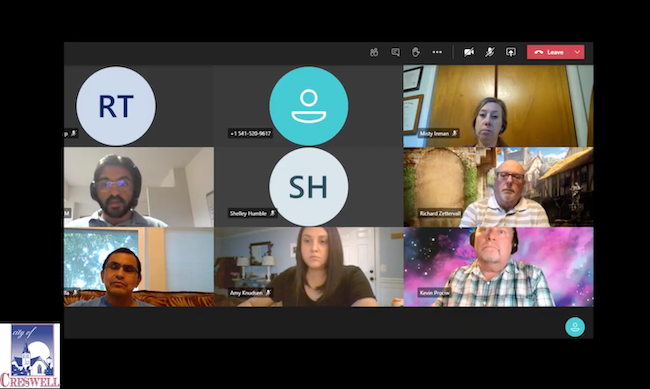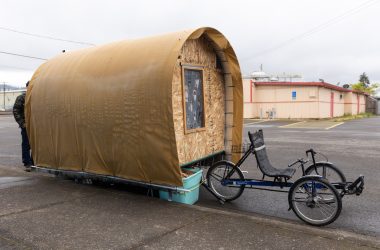
CRESWELL — Creswell city councilors said that when it tabled the subject of an equity resolution and committee at September’s meeting, it did not realize that it effectively killed the conversation regarding equity as a whole.
“Council tabled the conversation regarding equity, so that’s pretty broad,” city manager Michelle Amberg said at Monday’s meeting. Council now cannot entertain ideas of town halls on the subject, or even discuss it at meetings.
“You shouldn’t really even be discussing it now because you already took the motion and you’re kind of operating against the law of council rules right now,” Amberg said.
In July, council began its discussion on social justice. In August, council drafted an equity resolution that would recognize Black, Indigenous and other People of Color (BIPOC) who have suffered inequalities; is dedicated to building a community that promotes respect for everyone; that an equity commission be created; and that the city commits itself to embracing diversity.
But after pushback from the residents in the form of hundreds of comments on social media platforms, letters and emails to the council in September, council nixed its discussion on equity, saying tensions were too high to have the conversation now.
All councilors and the mayor on Monday said they did not realize that tabling the subject meant that it could not be revisited.
“I did not fully understand the full context of the implications of the motion and (that) was agreed to unanimously. That is 100% my fault,” Creswell Mayor Richard Zettervall said.
The only thing that council could do Monday was direct staff that council wanted to address the motion that was made at last month’s meeting, then have that discussion at the Oct. 12 meeting, Amberg said.
“Well, I will pay attention next time when somebody makes a motion that doesn’t include everything that I choose to table, because that was a really roundabout way to table something that I did not intend to table,” council president Amy Knudsen said. “I fully thought that we were going to have a discussion about an equity ordinance regarding a commission this evening. And the fact that we are not is very disappointing, and I’m very confused, and I’m about done with this meeting. So, are we moving forward or not, can the council answer that?”
The council was split on its consensus Monday, so the conversation is dead. Councilors Kevin Prociw, Alonzo Costilla and Martha McReynolds Jr. said removing the discussion from being tabled could cause the public to perceive the council as backpedaling on the subject, and would also create distrust. Councilor Judy Drago was absent.
“We really are at risk of appearing very disingenuous. At the last meeting we said that ‘we’ve tabled it, we’re done, we don’t want to poke at anyone.’ And right away, we’re planning the next poke,” councilor McReynolds said, and suggested the city move forward with town hall meetings, and later readdress the inclusion document and committee.
“You do not actually at this point have the right to call a town hall meeting on this topic because council took a motion and all together unanimously decided to table it and to not discuss any further. So you can very much be in violation of the council rules; you cannot do that,” Amberg said.
“We’ve come pretty close to or have already violated our council rules, and given also that we have understood that input is important, if we were to bring this forward again right now, this is going to be a huge shift for our trust and credibility on the council,” councilor Prociw said.
The hour prior, multicultural liaison and Creswell resident Kazim Zaidi discussed the fallout of the equity resolution and discussion.
“A change like this cannot be imposed from above,” Zaidi said. “It has to have deep roots in the community. I was hoping there wouldn’t be a controversial motion; clearly that wasn’t the case.”
Community reaction reflected that many people felt “attacked” by the topic of inclusion, Zaidi said, noting that with a complex issue such as this, the intent of the motion and the broader debate were difficult to separate and understand.
“There are deep misconceptions at play here. No one is under attack,” he said.
In an analogy, Zaidi on Monday clarified the difference between blame and responsibility of institutionalized racism.
“Imagine you inherit a big house, a big beautiful old house, but it hasn’t been maintained. The septic tank is busted; it’s rusty, it’s full, it’s leaking and it needs to be torn out completely. That’s not your fault,” Zaidi said. “You’re not responsible … But if you want to live in that house, it is your responsibility to fix it, and you’re not just responsible to yourself. You’re responsible to your neighbors, because as long as that septic tank isn’t fixed, it’s stinking up the neighborhood, and it’s poisoning the water supply.”
Zaidi again offered to facilitate town hall meetings and to personally meet with anyone to discuss these issues. He can be reached at [email protected]
“This is not about tearing anyone down. It is about making sure that the values that are enshrined in the Constitution of the United States are lived up to fully … It is about recognizing those mistakes, so that the future is better,” he said.
Zaidi said that one way to host a town hall would be through a panel discussion, which could be installed in Creswell in a couple of weeks if there was interest.
Amberg clarified Tuesday, however, that at this juncture, the city will not be moving forward with the town halls because of the council’s decision to table the topic and its inability to form a consensus Monday.
If the topic of equity were to come back to the council for discussion, it would have to be picked up by a new set of councilors and mayor, Amberg said.
“Council can’t preclude subsequent councils from taking action,” Amberg said. “So the fact that you will have three brand-new councilors, plus a new mayor (in January) provides efficient changeover that the new council set its own timing on this issue.”
“No racism here”
Knudsen said that feedback she’s heard from the community is that the state and Eugene-area policies are not reflective of the principles people hold in Creswell, and therefore have nothing to do with Creswell.
“I hear from people that (racism) is not happening here,” Prociw said.
Zettervall said he recalls when people who lived near him moved away because they were people of color and said they could no longer handle the abuse from the community.
“It was difficult to hear some of the things that they had experienced,” Zettervall said. “When people say ‘it doesn’t happen here,’ it is not true.”
That experience was reflected in a letter council received by a longtime Creswell resident named AJ, who omitted their last name out of safety concerns “as others who have spoken up within the community have been threatened with violence and harassed.”
“The anxieties of minorities of Creswell are very real,” AJ wrote to the council. “As a member of the LGBTQIA+ community, a gender non-conforming individual, I believe Creswell is failing its minorities. As a child I did not feel safe presenting outside the ‘norm,’ and as an adult I question my safety in public in Creswell.”
They said that actions like the ones that offset the passing of this ordinance on Sept.14, and the continued public resistance to address the concerns of the minorities of our community are only further underscoring the validity of minority’s anxieties.
“Until we can find a way to openly discuss, describe, and address inequality in Creswell, we will not be able to embody the moniker of a ‘Friendly City.’ Friendly to whom?,” AJ asked.
Creswell resident “Peter,” who also omitted his last name, also wrote to the council and said that Creswell does not promote love, acceptance and safety for everyone.
“I have friends and family members that do not feel safe traveling through or spending time in Creswell because they either look atypical or work to promote racial equality. This negatively impacts Creswell socially and economically,” Peter said.
Councilor Costilla said that a turning point for this conversation would be when more community members like AJ and Peter share their personal experiences and stories.
“I believe it will go a long way for others that think we don’t have a problem, that it does not exist here. No, we are not Eugene, but we are Cresswell and it does exist here,” Costilla said.
Zaidi said that the nature of the countryside that surrounds Creswell has been shaped by those policies over generations.
“In Lane County, there are too many examples to say our little town didn’t do this or isn’t responsible for this,” Zaidi said. “The fact is that we are all part of a larger system … The best thing to do, the most courageous thing to do, even if we don’t feel we were guilty of injustice, is to say, we are not happy to see injustice.”








